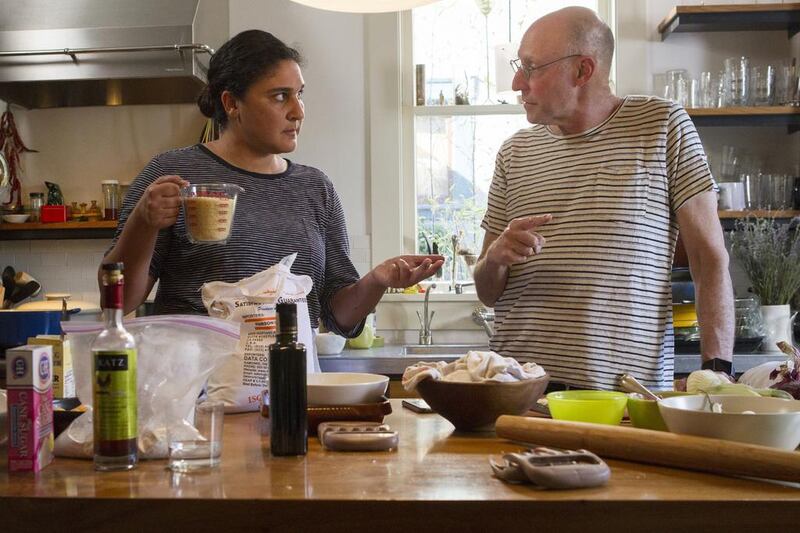In this era of corporate-driven fast food and microwave-meal expediency, what will it take to get us back in the kitchen to reclaim our lost cooking traditions and restore a healthy balance to our lives?
Issuing the clarion call for us to slip back into our aprons with Cooked, a sumptuous and gorgeous new four-part miniseries that is available now on Netflix, are best-selling foodie author Michael Pollan and Oscar-winning documentary filmmaker Alex Gibney. They are assisted by an all-star cast of globetrotting directors and cinematographers.
Their credentials are as impeccable as any Michelin-starred eatery.
In addition to being a maestro in the kitchen, Pollan is the bestselling author of Cooked: A Natural History of Transformation, published in 2013, upon which the four-part series is based, as well as The Botany of Desire: A Plant's-Eye View of the World; The Omnivore's Dilemma: A Natural History of Four Meals; and In Defense of Food: An Eater's Manifesto.
While more of a weekend barbecuer, Gibney is an Oscar and Emmy winner who is considered one of the most-important documentarians of our time. His resume includes Steve Jobs: The Man in the Machine; Going Clear: Scientology and the Prison of Belief; and Enron: The Smartest Guys in the Room.
His 2007 film Taxi to the Dark Side — about an innocent cab driver in Afghanistan who was tortured and killed while being held at Bagram Air Force Base in 2002 — won the Academy Award for Best Documentary Feature.
The pair put forward a persuasive argument that cooking is a primal human need and its discovery set us apart from apes and made us human — a theory that is shared by Harvard anthropologist Richard Wrangham, who appears in the show.
“Yes, this was one of my takeaways from Pollan’s book, which describes how we evolved as a species and escaped what I call the ‘tyranny of chewing’,” says Gibney.
“The Wrangham interview feels a little like a scene from a Hammer Dracula film where Van Helsing explains the deep history of the vampire. Surrounded by skeletons and gorilla skulls, Wrangham describes how we evolved from apes once we started eating cooked food. Our brains grew larger and we could be more productive [needing less time for chewing] once ‘an ape learnt to cook’.”
Each episode of Cooked examines one of the elements — fire, water, air and earth — and explores how we have used them through the ages to transform raw ingredients into tasty meals.
Visually it is a stunning journey through world cuisines, with lush cinematic scenes of deserts and tropical forests, stylised views of cooking techniques and the science of cooking, and hand-held cinéma vérité techniques that put us in the middle of the action.
Get ready to meet, among others, an Aboriginal tribe in western Australia that fire-roasts monitor lizards; a Benedictine nun and microbiologist in Connecticut who makes traditional French cheese; Peruvian brewers who use saliva to ferment a traditional beverage; and an ancient Moroccan granary powered by flowing rivers.
In each episode, Pollan welcomes us into his kitchen in Berkeley, California, where he appetisingly delivers his core message that, surrounded as we are by fast-food culture and processed foods, cooking our own meals is the single best thing we can do to take charge of our health and well-being.
As Gibney and Pollan tease our palates with a potent blend of compelling storytelling, food history, anthropology and the chemistry and physics of cooking, they remind us that home cooking is one of the best ways to safeguard health.
“People are starting to understand that unless you cook, you really can’t control your diet, and you’re ceding control of important elements of your life to corporations that really don’t care about your health,” says Pollan. “Unless you’re wealthy enough to pay a private chef, cooking is really the best and the only certain way to both improve our health and also support these really exciting changes going on in the food marketplace, such as small, diversified farms, CSAs [Community Supported Agriculture] and farmers’ markets.
“One of the reasons I wrote this book was that I realise the movement toward building an alternative, sustainable food system was going to top out if people weren’t going to cook. If you’re letting fast-food companies cook your dinner, they’re not going to be shopping at the farmer’s market.”
Americans, for example, only spend a pitiful 27 minutes a day preparing food, less than half of the time they spent in 1965.
Pollan hopes Cooked will move us back to the kitchen.
“Doing the series has been incredibly gratifying,” he says. “Here’s a chance to reach so many more people than a book can reach.
“If this can inspire thousands of people to put on an apron — men, women and children — I will be thrilled.”
• All episodes of Cooked are available now on Netflix
artslife@thenational.ae





